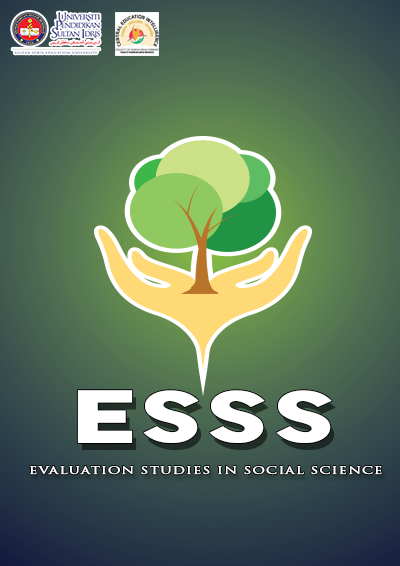A Critical Analysis on Universiti Pendidikan Sultan Idris Tamil Unit Student-Teacher Teaching Practice Experiences: A New Case Study Approach
DOI:
https://doi.org/10.37134/esss.vol4.2.2.2023Keywords:
teaching practices, student-teacher, Tamil teaching and learningAbstract
The experiences of undergraduates’ student-teachers from the Tamil unit program at Sultan Idris Education university who underwent teacher training are examined in this paper. A crucial part of teacher preparation is practical teaching experience. What the student-teacher has experienced in the teaching and learning environment is unknown, though. What experiences student instructors have while they are in the teaching practice phase is the topic that this study aims to discuss. Since this study is focused on the real-world experiences of student teachers, qualitative research was chosen as the method of inquiry. Additionally, experiential learning and reflective learning theory serve as the theoretical foundation for this investigation. In addition, it was noticed that they were not doing well in their teaching practices throughout the student evaluation. Five student-teachers participated in semi-structured interviews, and they also kept a reflective journal. Contextual information was obtained by document analysis using the student-teachers' reports. The data was analyzed and themes found using thematic analysis. Results showed that in certain schools, student-teachers were ill-prepared for the real teaching and learning environment. Additionally, at many schools, mentor teachers and other important individuals who play a crucial role in providing student support during teaching practice did not provide any assistance.
Downloads
References
Affrin, J. F., Andrade, H., & Mokshein, S. E. (2021). Classroom Assessment: New Norms of Student Assessments and Assessment-Related Research During COVID-19. Evaluation Studies in Social Sciences, 2, 1-3.
Banggu, J. binti, & Ag. Kiflee @ Dzulkifli, D. N. (2022). Penggunaan Ict dalam pengajaran dan pembelajaran subjek Sejarah PraUniversiti: Use of ICT in Teaching and Learning Pre-University History Subject. Evaluation Studies in Social Sciences, 3(1), 42–53.
Bredeweg, B., & Kragten, M. (2022). Requirements and challenges for hybrid intelligence: A case-study in education [Original Research]. Frontiers in Artificial Intelligence, 5. https://doi.org/10.3389/frai.2022.891630
Cranton, P. (2002). Teaching for transformation. New directions for Adult and Continuing Education, 2002(93), 63-72.
Dodd, A. W. (1990). Strategies for Effective Teaching. By Allan C. Ornstein. New York: Harper & Row, 1990. NASSP Bulletin, 74(530), 120-121.
Flick, U. (2013). The SAGE handbook of qualitative data analysis. Sage.
Harford, J., & MacRuairc, G. (2008). Engaging student teachers in meaningful reflective practice. Teaching and Teacher Education, 24(7), 1884-1892.
Hayes, D. (2010). Duty and service: Life and career of a Tamil teacher of English in Sri Lanka. Tesol Quarterly, 44(1), 58-83.
Kolb, D. A. (2014). Experiential learning: Experience as the source of learning and development. FT press.
Kumar, M. (2020). A Study on the Emotional Intelligence of Higher Secondary School Students. Shanlax International Journal of Education, 8(3), 114-119.
Lach, D. (2014). Challenges of interdisciplinary research: Reconciling qualitative and quantitative methods for understanding human–landscape systems. Environmental Management, 53, 88-93.
Loughran, J. J. (2002). Developing reflective practice: Learning about teaching and learning through modelling. Routledge.
Mellon, C. (2023). Lessons from the road less travelled: student teachers' and newly qualified teachers' experiences of mentoring in the Irish further education and training sector. International Journal of Mentoring and Coaching in Education, 12(4), 387-401.
Miller, C. B. (2023). The Bloomsbury Handbook of Ethics. Bloomsbury Academic.
Miranda, J. A., & Wahyudin, A. Y. (2023). Pre-Service Teachers’strategies In Improving Students’speaking Skills. Journal of English Language Teaching and Learning, 4(1), 40-47.
Moule, P., Aveyard, H., & Goodman, M. (2016). Nursing research: An introduction. Sage.
Muin, I. F. M. F., & Perveen, A. (2020). The Relationship between Hopelessness, Extraversion Trait and Academic Achievement among Undergraduate University Students. Evaluation Studies in Social Sciences, 1(1), 44-53.
Perry, R. (2013). Teaching practice for early childhood: A guide for students. Routledge.
Ramsden, P. (2003). Learning to teach in higher education. Routledge.
Sá, M. J., & Serpa, S. (2023). Metaverse as a learning environment: Some considerations. Sustainability, 15(3), 2186.
Shuib, S., & Yusof, H. (2020). Development of Teachers’ Professionalism on Self-Effectiveness of Secondary School Teachers in Selangor State: Pembangunan Profesionalisme Guru terhadap Efikasi Kendiri Guru Sekolah Menengah di Negeri Selangor. Evaluation Studies in Social Sciences, 1(2), 37-48.
Silver, N., Kaplan, M., LaVaque-Manty, D., & Meizlish, D. (2023). Using reflection and metacognition to improve student learning: Across the disciplines, across the academy. Taylor & Francis.
Simelane, S., & Mji, A. (2014). Impact of technology-engagement teaching strategy with the aid of clickers on student's learning style. Procedia-Social and Behavioral Sciences, 136, 511-521.
Stronge J. H. (2002). Qualities of effective teachers. Alexandria, VA: Association of Supervision and Curriculum Development.
Younus, F., & Akbar, R. A. (2017). Comparison of Evaluation Methods of Teaching Practice of Formal and Non-Formal Teacher Education Institutions of Punjab. Bulletin of Education and Research, 39(1), 159-173.
Downloads
Published
How to Cite
Issue
Section
License
Copyright (c) 2023 Kaaminy Kanapathy, Marlina Jamal, Rony Kae Mary Pranchis, Vennila Venkatachalapathy

This work is licensed under a Creative Commons Attribution-NonCommercial-ShareAlike 4.0 International License.





